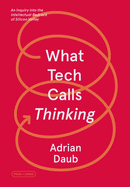
Silicon Valley and its take on technological improvements and problem-solving have so shaped contemporary life that its moguls are often uncritically held up as maverick geniuses who have broken past norms to build a new world. But, as Adrian Daub, professor of comparative literature and German studies at Stanford University, deftly explicates in What Tech Calls Thinking: An Inquiry into the Intellectual Bedrock of Silicon Valley, the so-called genius of leading tech thinkers may be less about inherent radical individualistic enlightenment and more the repetition of sophomoric platitudes cushioned by financial safety nets and tight-knit communities.
Daub's text focuses on tech's favorite buzzwords, such as "dropping out," "disruption," "failure," "communication" and "genius." He explores Silicon Valley's philosophical underpinnings--and perhaps most importantly, the misunderstandings or misinterpretations--that have turned these phrases into industry jargon, intentionally obscuring their real meanings. Most importantly, Daub demonstrates how often tech endeavors to solve problems it causes in the first place. Under Daub's concise, witty and often pointed analysis, the mythology surrounding such well-known names as Theil, Theranos, Facebook, Palantir and even Pixar are deconstructed to reveal old conservative motifs dressed up in futuristic euphemism. As such, the destructive impulses of Silicon Valley are revealed for what they are, as is "the nonchalance with which tech companies destroy livelihoods and entire professions in the name of innovation." Daub makes clear that "what tech calls thinking" often bypasses decades of thought in unrelated fields grappling with similar problems, and why that is a problem that needs closer attention. --Michelle Anya Anjirbag, freelance reviewer

